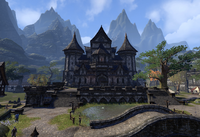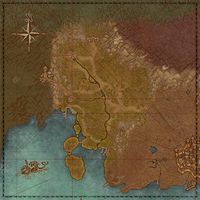| Alcaire | |
|---|---|
| Type | Settlement |
| Continent | Tamriel |
| Province | High Rock |
| Region | Stormhaven (Alcaire) |
| Appears in | Daggerfall, ESO |

Alcaire is a city located in central High Rock and it is the capital of the eponymous fiefdom in the north-central Iliac Bay. By the mid-Second Era, it was known as Alcaire Castle, a castle-town built on the highest point in the region, near the road to Rivenspire.[1] At the time, it was also the home of the Knights of the Flame, who swore fealty to the monarchy. Fables at the time told that a future ruler would be born from within its ramparts.[2]
Layout and GeographyEdit
Alcaire Castle is located on the northernmost point of the region, at the top of a small waterfall that drains into a river.[1] The waterfall itself bubbles up from another river found underground.[3] The outside river travels down through the Alcaire region to the Iliac Bay, right where the town, Steelheart Moorings is built. Outside of the city's walls are fields and woodland, typically populated by farmsteads and homes along the riverbank.[1]
The city sits at a crossroad between the farmland across Alcaire, the northern road to Rivenspire, and the eastern road to central Stormhaven and Wayrest. The latter is also where Firebrand Keep is located, the previous home of the Knights of the Flame, sworn protectors of Alcaire.[1] That road was originally protected by an outwork of Firebrand Keep called Portdun Watch, but that had fallen into disrepair.[4]
Alcaire Keep, the castle that settlement is built around is located on a hill that overlooks the region. It is completely walled-off from the outside and its ramparts are a couple of homes, the local inn, and the marketplace. The waterfall is accentuated with two knight statues. Behind the castle is a monument to Sir Byric,[1] whose actions became the namesake for the Knights of the Flame.[5] Outside of the walls are a couple more homes, small remains of ruins on the north side of the river, and camps owned by the local guilds or other factions.[1]
Notable LocalesEdit
|
|
HistoryEdit
It is unknown when the settlement was founded, but the Dukes of Alcaire have ruled the region since the late First Era.[7] Many years ago, there was a terrible war that plagued Alcaire Castle and afterward, its steward declared a contest. Whichever performer delighted the castle's survivors the most would win great renown. Ever since then, a New Life Festival traditional had started called the Castle Charm Challenge.[8] When Durcorach the Black Drake invaded High Rock in 2E 542, many of Alcaire's people fled southeast toward Wayrest[9] but even so, Alcaire Castle was still defended by its knighthood. In an attempt to hold back the Reach horde, Sir Byric set the fields around the castle ablaze, which successfully held them back. To honor his bold action and determination, the Alcaire Knights were renamed to the Knights of the Flame and a statue of him was erected outside the castle.[5]
By the sixth century of the Second Era, Alcaire Castle was occupied by Duke Nathaniel of House Cumberland, the brother of High King Emeric and he was betrothed to Princess Lakana,[2] the second-daughter of King Fahara'jad.[10] Sometime later in 2E 582, the Alcaire region was terrorized by a cult of Vaermina worshippers called the Supernal Dreamers, who eventually became a more significant threat throughout Stormhaven.[11] The cultists inflicted the leader of the Flame Knights, Sir Hughes with the Omen of Fear,[12] which fed him horrible dreams of Alcaire's downfall at the hands of Duchess Lakana. In secret, he devised plans for her death for the sake of his people and home.[13]
On the 29th of First Seed, Alik'ri poison, purchased by Dame Falhut, a Breton member of the Knights of the Flame, was placed in the Duchess' food, which inadvertently killed one of her tasters.[13][14] In secret, the Duchess sent messages back home to inform her father about the situation.[14] A couple of days later on the 2nd of Rain's Hand,[13] Lakana's closest friend, Darima traveled to Alcaire Castle as an envoy with General Thoda of Hammerfell's armies and a large regiment of soldiers to tell her the identity of the assassin. However, she was denied entry into town by Dame Falhut.[15][16] Despite that, the intel was successfully passed on to the Duchess and she assigned an Agent of the Daggerfall Covenant to work with Sir Hughes, to prevent any further insurrection.[17] But while the Agent confronted Dame Falhut,[18] Sir Hughes went to Alcaire Keep and killed the Duchess, before fleeing to Firebrand Keep.[19]
By the late-Third Era, the Fiefdom of Alcaire was ruled by an unknown Lord and hosted the Temple of Kynareth. In the mid-Second Era, it was an open city but by 3E 405, it was walled and it had a cemetery.[6] When the Warp in the West took place in 3E 417, Alcaire and many other regions in the eastern half of the Bretonic-Iliac Bay were absorbed into the Kingdom of Wayrest, at the time ruled by King Eadwyre and Queen Barenziah.[20]
GalleryEdit
See AlsoEdit
- For game-specific information, see the Daggerfall and Elder Scrolls Online articles.
BooksEdit
- Statue of Sir Byric — A plaque describing the origins of the Knights of the Flame
ReferencesEdit
- ^ a b c d e f Alcaire location in ESO
- ^ a b The Improved Emperor's Guide to Tamriel: High Rock — Flaccus Terentius, 2E 581
- ^ Elam Dral's dialogue during Contract: Rivenspire in ESO: Dark Brotherhood
- ^ Portdun Watch loading screen text in ESO
- ^ a b Statue of Sir Byric
- ^ a b c d e Alcaire in Daggerfall
- ^ Alcaire Keep loading screen text in ESO
- ^ Breda's dialogue in ESO
- ^ Triumphs of a Monarch, Ch. 3 — His Majesty King Emeric
- ^ The Royal Lineage of Sentinel
- ^ Letter from Duke Nathaniel — Duke Nathaniel
- ^ Sir Hughes' Fate story quest in ESO
- ^ a b c Sir Hughes' Journal — Sir Hughes
- ^ a b Duchess Lakana's dialogue in ESO
- ^ Army at the Gates story quest in ESO
- ^ Envoy Darima's dialogue in ESO
- ^ Two Sides to Every Coin story quest in ESO
- ^ Life of the Duchess story quest in ESO
- ^ The Safety of the Kingdom story quest in ESO
- ^ The Warp in the West — Ulvius Tero
